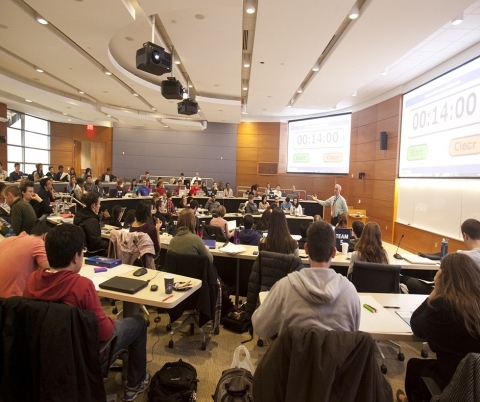Developing Best Practices for Trauma-Informed Teaching and Learning (2022-2023)
Stress associated with trauma is likely present in every student gathering at Duke University — not only in each student organization and residence hall, but also in every classroom and laboratory. While in recent years Duke has invested heavily in providing high-quality mental health and support services to trauma survivors, there is a gap in understanding how stress and trauma show up in classrooms and academic programs.
Building on the work of previous teams, this team aimed to address the need for trauma-informed education for students and faculty to promote a positive learning experience. They conducted focus groups among students and faculty at Trinity, Pratt, the Divinity School and the School of Medicine, exploring how participants experience and address the topic of trauma in the classroom.
Team members also continued qualitative analysis of focus group data in order to identify salient research findings to be shared both at Duke and beyond. Finally, they implemented Trauma-Engaged Duke seminars throughout the university to further educate students and faculty on trauma and its widespread effects.
Timing
Fall 2022 – Spring 2023
Team Outputs
Trauma-Engaged Duke seminars
Focus group datasets and analysis
This Team in the News
Devoted Team of “Trauma Champions” Envisions Changes to the University Classroom
See related teams, Developing Best Practices for Trauma-Informed Teaching and Learning (2023-2024) and Developing Best Practices for Trauma-informed Teaching and Learning (2021-2022).
Image: Duke University first-year medical students listen to a lecture about the brain in the Learning Hall of the Trent Semans Center, by Jared Lazarus/Duke Photography

Team Leaders
- Jan Holton, Divinity School
- Warren Kinghorn, Divinity School|School of Medicine-Psychiatry and Behavioral Sciences
/graduate Team Members
-
Franz Belz, Medicine MD Fourth Year
-
Alexander Exum, Anglican Studies, Divinity-MDV
-
Frédérique Ndatirwa, Master of Theology
-
Emily Peairs, Medicine MD Fourth Year
-
Alexandria Soto, Medicine MD Third Year
-
Anna Whitaker, Theological Studies-MTS
/undergraduate Team Members
-
Anna Greenleaf, Psychology (BS)
-
Christina Lewis, Religion (AB)
-
Molly Pluenneke, Psychology (AB)
-
Timothy Wilkinson, Chemistry (AB)
/yfaculty/staff Team Members
-
Hudaisa Hafeez, School of Medicine-Psychiatry and Behavioral Sciences
-
Stephanie Hargrove, School of Medicine-Psychiatry and Behavioral Sciences
-
Noga Zerubavel, School of Medicine-Psychiatry and Behavioral Sciences
